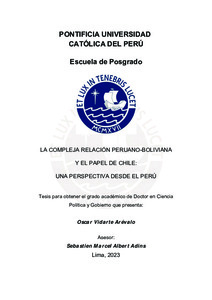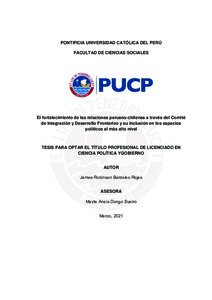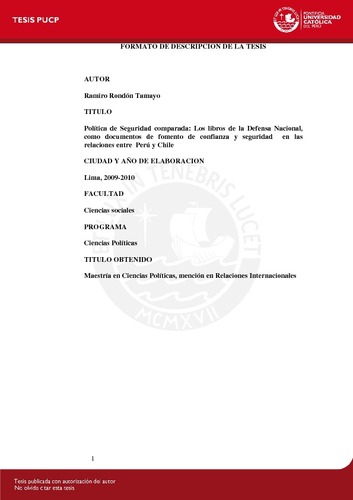| dc.contributor.advisor | Adins, Sebastien Marcel Albert | |
| dc.contributor.author | Vidarte Arévalo, Oscar | |
| dc.date.accessioned | 2024-04-16T17:29:04Z | |
| dc.date.available | 2024-04-16T17:29:04Z | |
| dc.date.created | 2023 | |
| dc.date.issued | 2024-04-16 | |
| dc.identifier.uri | http://hdl.handle.net/20.500.12404/27565 | |
| dc.description.abstract | La presente investigación busca demostrar, desde un enfoque que hace énfasis
principalmente en una perspectiva peruana (tanto de fuentes documentales
como entrevistas), la relevancia de la política exterior chilena en la construcción
de la relación entre Perú y Bolivia. A pesar de la importante agenda bilateral
existente entre peruanos y bolivianos, Chile se ha consolidado como un actor
clave que no ha favorecido el desarrollo de dicho vínculo.
Los intereses chilenos, muchas veces en competencia con el Perú, pueden
identificarse desde el surgimiento de los tres países como repúblicas
independientes. En el siglo XIX, la guerra contra la Confederación peruanoboliviana
y la Guerra del Pacífico fueron momentos determinantes. En el siglo
XX, las diferencias fronterizas entre Perú y Chile, y la mediterraneidad de Bolivia
(que involucraba tanto a Chile como a Perú), no ayudaron en la construcción de
la relación entre Perú y Bolivia.
Ya para finales del siglo XX e inicios del XXI, en un contexto internacional mucho
más favorable, esta dinámica de competencia continuó expresándose en otros
ámbitos. Aunque ya no implicaba la posibilidad de algún escenario bélico o
pérdida de soberanía, siguió impactando negativamente en la relación que Perú
y Bolivia han buscado desarrollar.
Tampoco se trata de la única razón que explica la debilidad histórica de la
relación entre Perú y Bolivia, pero sin ninguna duda sigue estando presente,
demostrando la particularidad del nexo que existe entre los tres países. | es_ES |
| dc.description.abstract | This research seeks to demonstrate, from an approach that emphasizes mainly
a Peruvian perspective (both from documentary sources and interviews), the
relevance of Chilean foreign policy in the construction of the relationship between
Peru and Bolivia. Despite of the important bilateral agenda existing between
Peruvians and Bolivians, Chile has consolidated itself as a key actor that has not
favored the development of this link.
Chilean interests, often in competition with Peru, can be identified since the
emergence of the three countries as independent republics. In the 19th century,
the war against the Peruvian-Bolivian Confederation and the War of the Pacific
were decisive moments. In the 20th century, the border differences between Peru
and Chile, and Bolivia's Mediterranean nature (which involved both Chile and
Peru), did not help in the construction of the relationship between Peru and
Bolivia.
By the end of the 20th century and the beginning of the 21st century, in a much
more favorable international context, this dynamic of competition continued to be
expressed in other spheres. Although it no longer implied the possibility of a war
scenario or loss of sovereignty, it continued to have a negative impact on the
relationship that Peru and Bolivia have sought to develop.
It is not the only reason that explains the historical weakness of the relationship
between Peru and Bolivia, but it is undoubtedly still present, demonstrating the
particularity of the nexus that exists between the three countries. | es_ES |
| dc.language.iso | spa | es_ES |
| dc.publisher | Pontificia Universidad Católica del Perú | es_ES |
| dc.rights | info:eu-repo/semantics/closedAccess | es_ES |
| dc.subject | Perú--Relaciones exteriores--Bolivia | es_ES |
| dc.subject | Bolivia--Relaciones exteriores--Perú | es_ES |
| dc.subject | Perú--Relaciones exteriores--Chile | es_ES |
| dc.subject | Chile--Relaciones exteriores--Perú | es_ES |
| dc.subject | Bolivia--Relaciones exteriores--Chile | es_ES |
| dc.subject | Chile--Relaciones exteriores--Bolivia | es_ES |
| dc.title | La compleja relación peruano-boliviana y el papel de Chile: una perspectiva desde el Perú | es_ES |
| dc.type | info:eu-repo/semantics/doctoralThesis | es_ES |
| thesis.degree.name | Doctor en Ciencia Política y Gobierno | es_ES |
| thesis.degree.level | Doctorado | es_ES |
| thesis.degree.grantor | Pontificia Universidad Católica del Perú. Escuela de Posgrado | es_ES |
| thesis.degree.discipline | Ciencia Política y Gobierno | es_ES |
| renati.advisor.cext | 000405232 | |
| renati.advisor.orcid | https://orcid.org/0000-0002-7029-3369 | es_ES |
| renati.author.dni | 07535799 | |
| renati.discipline | 312018 | es_ES |
| renati.juror | Dargent Bocanegra, Eduardo Hernando | es_ES |
| renati.juror | Adins , Sebastien Marcel Albert | es_ES |
| renati.juror | Dongo Sueiro, Mayte Anais | es_ES |
| renati.juror | Romero Sommer, Gonzalo Emilio Julio | es_ES |
| renati.juror | Legler, Thomas Fridolin | es_ES |
| renati.level | https://purl.org/pe-repo/renati/level#doctor | es_ES |
| renati.type | https://purl.org/pe-repo/renati/type#tesis | es_ES |
| dc.publisher.country | PE | es_ES |
| dc.subject.ocde | https://purl.org/pe-repo/ocde/ford#5.06.00 | es_ES |









